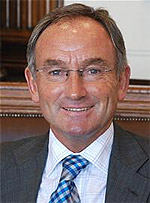 Brian Kenny, Mersey Branch’s Political Officer and North West Regional Political Sub-Committee Vice Chair; gives his personal view of the General Election and makes a surprising admission on the performance of the Labour Leader:
Brian Kenny, Mersey Branch’s Political Officer and North West Regional Political Sub-Committee Vice Chair; gives his personal view of the General Election and makes a surprising admission on the performance of the Labour Leader:
Well, the General Election was held on June 8th.
On paper, the Tories won it, with more seats than any other Party, but, in reality, it was a disastrous night for the Tories, and a great night for the Labour Party.
Locally, I have been campaigning particularly within the 4 Wirral seats, where we won each one, with greatly increased majorities.
CWU’s Regional Secretary, Carl Webb had asked me to be the CWU North West Coordinator for both Wirral West and Wirral South, and I was delighted that we did so well in both of those seats.
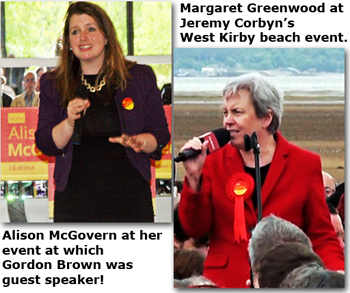 As we increased the majorities in our key marginal seats of Wirral South, Wirral West and regained the seat in Warrington South, last Thursday was a hugely positive result for Labour.
As we increased the majorities in our key marginal seats of Wirral South, Wirral West and regained the seat in Warrington South, last Thursday was a hugely positive result for Labour.
The Labour Party campaign energised young voters and hundreds of thousands of Labour and trade union members, many who got “out on the street” to campaign for it.
I was a CWU steward on the beach in West Kirby, when Jeremy Corbyn came to address a massive crowd, which some estimated at around 4,000. It was a huge success, in every respect.
As a union, we need to continue to connect our industrial and political agendas and to drive forward our work to deliver a New Deal for Workers and re-assert trade union values in this country.
To stay as Prime Minister, Theresa May needs the votes of MPs from a Northern Irish party called the Democratic Unionist Party (DUP). I am concerned that this hands the DUP too much power – and that the DUP could use this power to impose their dangerous views on climate change, or gay rights etc.
When Theresa May called a General Election, she underestimated the Labour Party.
Now, she is without the majority she felt certain of, without the mandate she demanded, and with her government in conflict and chaos.
I totally agree with George Osborne, (I have never said that before!), when he said on TV that Theresa May is a “Dead woman walking”.
Labour has made a series of standout gains at the end of an election in which Theresa May was humiliated.
Jeremy Corbyn looks much safer in post today, even though Labour has lost its third consecutive general election, because he has surprised his considerable band of doubters – myself included, to be honest.
The SNP fell back a long way, down 21 seats to 35, while the Lib Dems are still close to irrelevance, and Nick Clegg finally lost his seat in Sheffield.
Jeremy Corbyn has called on Theresa May to resign and said she should "make way" for a government "truly representative of the people of this country”.
"We are ready to serve", he told the BBC.
It seems, however, that Labour will not form a minority government, Theresa May, meanwhile, is simply desperate, after voters punished her for an opportunistic election, a series of u-turns and what amounts to a vacuum on any serious plan for the economy or for Britain. She headed to Buckingham Palace last Friday and continues to claim a mandate to form a government, with informal backing from the DUP.
Labour has lost, and we must not get too carried away, but the party has made some suprising and amazing advances, which augurs well for the future.
She may have “won”, but Theresa May will feel like a “loser” today. I can’t believe that The Tories will allow her to fight another general election as party leader, while Jeremy Corbyn will certainly lead the Labour Party into the next General Election – whenever it is.
The turnout figure was 69%, which is the highest turnout since Tony Blair’s first election victory in 1997. We will all have to see the detailed analysis, but it looks as if lots of young people registered to vote once the election was called, and that a larger proportion of the young electorate turned out to vote, than has usually been the case.
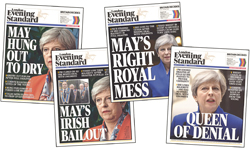 It’s been a terrible election for Theresa May. She became Prime Minister without having to face a contest in the Conservative Party, and she had a remarkably easy year in office.
It’s been a terrible election for Theresa May. She became Prime Minister without having to face a contest in the Conservative Party, and she had a remarkably easy year in office.
Then, having repeatedly said that no General Election would be called, she changed her mind for what was rightly seen as crude party political advantage.
Her manifesto contained some electorally damaging proposals which seriously derailed the Tory campaign. May herself targeted the wrong seats in her travels and refused to face genuine audiences or debate directly with Jeremy Corbyn.
The “Guardian” political satirist John Crace dubbed her “Maybot” because of her robotic responses to questions, when she attempted to dodge the issues and repeated the same meaningless phrases,,,,,,”Strong and stable leadership” etc.
I confess that as a lifelong Labour Party member I did not vote for Jeremy Corbyn in either of the Labour leadership elections. I felt that his performance over the last couple of years has been very poor (although improving), and I feared that a General Election with him as Labour leader would result in substantial losses.
I was wrong.
He performed well on the stump and in the studios, he enthused voters (especially young ones), and he has done remarkably well to improve Labour’s share of the vote and number of seats so significantly. Indeed the increase in Labour’s vote share of 9.6 percentage points was the largest for any party between two general elections since 1945.
Let’s look at the other parties.
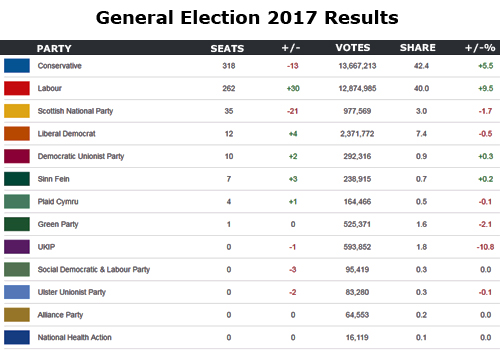
For decades now, the combined share of the vote taken by Conservatives and Labour has diminished, as the two-party model fractured.
This election has dramatically reversed this trend (the two parties took 82.4% of the votes). The Liberal Democrats, the Greens and especially UKIP all did badly and only have a mere 13 seats between them (losing Nick Clegg in the process). The UKIP leader, Paul Nuttall, from Bootle, has already resigned and the party is in melt-down (which is excellent news!).
The Scottish National Party could never have done better this time than in 2015 when they won every seat, but three, in Scotland. But their loss of 21 seats is a disaster for them. The big issue north of the border was the SNP demand for a second referendum on devolution (known as indyref2). Clearly voters in Scotland don’t want another referendum in the near future and have punished the SNP – taking some big scalps (Alex Salmond and Angus Robertson) – for pushing for one.
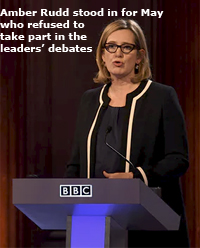 So now Britain will have a new government just days before the Brexit negotiations begin. May said she offered “strong and stable government” compared to the alternative of “a coalition of chaos”.
So now Britain will have a new government just days before the Brexit negotiations begin. May said she offered “strong and stable government” compared to the alternative of “a coalition of chaos”.
The minority Conservative Government will NOT be strong or stable and will be beholden to the demands of the 10 MPs from the DUP in Northern Ireland. Two years ago, the Tories said that Ed Miliband as PM would be a prisoner of the SNP (which at least had powerful representation and progressive policies) but now the Tories are the prisoner of a socially-conservative party with less than a dozen seats.
When the election was first called, I (along with many other people), expected Labour to do so badly that Jeremy Corbyn would be forced to resign. Instead, he is stronger than ever, and in the ultimate test of electoral opinion, he has done really well.
Theresa May now heads a minority government in a hung parliament, facing immensely complex Brexit talks. Her days as leader must be numbered.
The whole political situation is so unstable that I believe there will be another General Election in October this year.
If so, BRING IT ON!! Watch this space!
Posted: 1st January 2017
